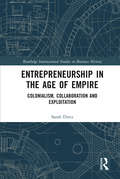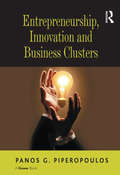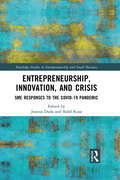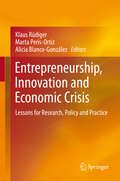- Table View
- List View
Entrepreneurship in the Age of Empire: Colonialism, Collaboration and Exploitation (Routledge International Studies in Business History)
by Sarah DietzExploring the interplay of politics and commerce in one of the most dynamic periods of British history, this book traces the fortunes of the India and Eastern Trading Company Limited, established in 1906 to finance a jute plantation in Assam, north-east India. In a watershed period for commercial culture, as family capitalism and industrial economics gave way to a predominance of speculative investment and the marketing of ideas, analysis of this London-registered company and its international management forms a lens through which to view the broader socio-political and economic environment of the late-Victorian period to the interwar. Mapping the eclectic bonds that created a network of association between a multinational cast of merchants, company promoters, mining engineers, politicians and industrialists, reveals the multiplicity of strands which coalesced to create one share company. By examining their responses to the opportunities created by colonialism: to enabling legislations and set-backs, to competition and collaboration, internationalism versus rising nationalism, an important era in British history is examined from an entirely fresh perspective. The history of the India and Eastern Trading Company Limited is a tale of cloaked agendas, of land speculation under the guise of colonial agriculture, of German and Russian interests embedded in British-empire prospects, which exposes the intrigues of some of the most infamous imperialists of the era; figures who were the subject of intense academic scrutiny throughout the twentieth century and remain at the forefront of impassioned debate in the twenty first.
Entrepreneurship in the Asia-Pacific: Case Studies
by Jing Wang Hua Bai Ke Xing Michitaka KosakaThis book is dedicated to the analysis of the entrepreneurship in successful companies by presenting and comparing a series of case studies in the Asia-Pacific where many new companies have been growing successfully in the 21th century. In total, 5 cases in the manufacturing industry, 4 cases in the services industry, and 3 cases related to new business and social innovation are chosen from The mainland of China, Taiwan, Japan, Australia, Malaysia and Vietnam. Each case provides insight into the entrepreneur’s aspiration, the processes of personal and business developments, the factors of success, and the inspirations drawn from the analysis. These cases are analyzed and compared from the viewpoints of entrepreneur’s motivation, ability of foreseeing changes and opportunities in the future business environment, core resources and innovation, knowledge management and culture for the company, determination and ethos. These are critical factors in value creation for customers and the society, especially in the future business environment. Finally, commonalities and uniquenesses in entrepreneurship relevant to industry sectors and social-economic-cultural contexts are clarified and a typical entrepreneurship model in the Asia-Pacific is proposed.
Entrepreneurship in the Balkans: Diversity, Support and Prospects
by Robert C. Schneider Veland RamadaniThis book represents a comprehensive state-of-the-art picture of entrepreneurship and small business management issues in the Balkans region. It provides major theoretical and empirical evidence that offers a brighter view of these fields and aims to open up opportunities for greater dialogue in public policy. The readers would be able to enhance their knowledge on small businesses and innovation issues in the Balkans. An outcome of a long lasting endeavour, this book includes contributions of highly reputed authors and experts from the Balkans' countries. Features forewords by two well-known personalities of this field, Leo Paul Dana and Alain Fayolle.
Entrepreneurship in the Creative Industries: How Innovative Agents, Skills and Networks Interact
by Phillip McIntyre Janet Fulton Susan Kerrigan Michael MeanyThis books provides a critical perspective on entrepreneurialism in the creative industries. Split into three sections, the book first asks the contextual question; why, at this point in time, did we arrive at such a focus on entrepreneurship in the creative industries? Examining the historical, social, cultural, economic and political background, the book places the creative industries and entrepreneurship firmly within a systemic approach to creativity and cultural production. Given this emphasis on entrepreneurship in the creative system, the second part of the book asks, what do those who want to work in the creative industries need to do to pragmatically gain an income? The practices, skills, business models and plans necessary to master in order to successfully run a business are explored in this section. The final section contains detailed case studies that reveal the lives of those who found a way to successfully gain an income in the creative industries. It highlights the practical knowledge they gathered, how they negotiated their field of endeavour, and the decisions they made in the real world.Fundamentally the book answers three questions: How and why did we get here? Given that we are here at this point in time, how do we go about being entrepreneurial? And who has managed to do this in the creative industries and how did they do it? Covering both theoretical debates in detail, and practical case studies in key sub-sectors of creative industries, this truly integrative and far-reaching volume will be of interest to students, researchers and practitioners alike.
Entrepreneurship in the Digital Era: Case Studies, Approaches, and Tools for Ecosystems, Business Models, and Technologies (Management for Professionals)
by Daniel Schallmo Jens Pätzmann Thomas ClaußChanges in the environment such as trends, drivers, and influencing factors affect entrepreneurship and intrapreneurship in several ways. The changes of the environmental factors in several dimensions such as political, economic, socio-cultural, technological, ecological, and legal. On the one hand, the environmental changes include risk for existing business models. On the other hand, they include opportunities for new business models, entrepreneurship, intrapreneurship, and new insights in marketing. This book provides empirical and conceptual papers and studies that tackle the challenges and opportunities for entrepreneurship in the digital era. It offers professionals, managers, researchers, lecturers, and students from the fields of entrepreneurship, innovation management, and business development valuable insight into the topic of entrepreneurship in times of digitalization.
Entrepreneurship in the Fourth Sector: Entrepreneurial Ecosystems and Sustainable Business Models (Studies on Entrepreneurship, Structural Change and Industrial Dynamics)
by Conceição Rego Maria Raquel Lucas María Isabel Sánchez-Hernández Luísa Carvalho Adriana Noronha“The fourth sector” is a relatively new sector that consists of for-benefit organizations that combine market-based approaches of the private sector with the social and environmental aims of the public and non-profit sectors. This book examines trends of entrepreneurship in the fourth sector, describes specific ecosystems fostering new ventures around the world, and characterizes the most common and innovative business models. It covers as well the main effects, among others, of technological change, innovation, and institutional behavior on the sector in the last years.
Entrepreneurship in the Global Economy
by Henry Kressel Thomas V. LentoEntrepreneurs have long been drivers of innovation in developed countries. They start companies and create new industries that keep economies strong and prosperous. Today, however, in developing nations such as China, state-controlled economies are building robust industries at stunning speed and siphoning off jobs from the West. How can entrepreneurs function in the face of this challenge? Can they continue to create economic value in a globalized business environment? This book addresses the crucial issue of state planning vs. free enterprise and examines specific problems surrounding entrepreneurship in the global economy through nine case histories of entrepreneurial companies. It also looks at how and why government gets involved in economic growth and how entrepreneurs contribute to economic value. Based on this analysis, the authors argue that companies can succeed, even in controlled economies, by understanding the customs and policies of countries where they do business.
Entrepreneurship in the Global Firm: Enterprise and Renewal (SAGE Strategy series)
by Julian Birkinshaw`A major contribution of this exciting book is the perspective of the subsidiary manager operating network.... In its extreme version this means that all managers are subsidiary managers... challenging those who still view multinationals as hierarchies. With exceptional clarity of thought and writing, Julian Birkinshaw stakes out the ground as a major new thinker in the fields of international business and strategic management ' - Alan Rugman, Templeton College, University of Oxford Much current literature on globalization and competition focuses on the external environment in which firms operate. Julian Birkinshaw's book looks within international firms at the dynamics that affect their growth and position. Are local managers seizing power from the centre? Is `glocialization' the inevitable result of globalization? Based on fresh case evidence gathered in Europe and North America, the findings in this book about multi-national firms and managers make a significant contribution to some of the key debates on the transfer of knowledge in firms; the resource-based view; and the network forms of organization. The initiatives of local managers reflect local knowledge, skills and resources and at the same time impact of the distribution of power in the wider organization. By taking as his perspective that of the subsidiary manager operating in a network, Julian Birkinshaw extends the implications of his findings to all managers in organizations and challenges those who still view organizations as hierarchies.
Entrepreneurship in the Hospitality, Tourism and Leisure Industries
by Michael Rimmington Clare Williams Alison MorrisonEntrepreneurship is the engine that drives any successful industry or economy. In the rapidly evolving hospitality, tourism and leisure sector worldwide this is particularly true. This new text is designed to develop a greater understanding of the process and context for entrepreneurship as well as to provide key concepts which will enable the reader to become more entrepreneurial themselves. The text unites appropriate theory with copious real world examples giving the student, manager or trainer a powerful framework for understanding every aspect of this vital business function. Rigorously developed by authors with wide teaching and industry experience it contains: *Clear learning objectives and teaching structure *Up-to-date cases throughout *The widest possible coverage of the latest research and literature *A clear focus on the dynamic hospitality, tourism and leisure sector.Entrepreneurship in the Hospitality, Tourism and Leisure Industries is an essential teaching tool and reference on all serious academic and professional courses and gives a uniquely powerful overview of the subject for students and trainees.
Entrepreneurship in the Informal Economy: Models, Approaches and Prospects for Economic Development (Routledge Studies in Entrepreneurship #4)
by Mai Thi Thanh Thai Ekaterina TurkinaAlthough entrepreneurship in the informal economy occurs outside state regulatory systems, informal commercial activities account for an estimated 30% of economic activity around the world. Informal entrepreneurship goes unmonitored despite the fact that it significantly contributes to poverty reduction and economic development. As a result, the informal sector is open to unethical practices including corruption, worker exploitation, and natural environment abuse to name just a few. In the media, debates have formed around whether informal entrepreneurship should be assisted or legitimized. Hence, a deep understanding of the phenomenon is vitally important. This book is the first on the market to offer models and approaches to informal entrepreneurship as well as to its prospects for economic development. Offering an in-depth examination of informal entrepreneurship in many different countries, it reveals the motivations for engaging in entrepreneurship in the informal economy, characteristics of informal entrepreneurship, and informal entrepreneurs’ response to ethical issues. This volume illustrates the relationship between formal and informal economies and the conditions for the benefits of informal entrepreneurship to outweigh its disadvantages. And finally, it gives recommendations about when and how the informal economy can be formalized, which sectors should be formalized, and which ones can remain informal. This book offers much-needed guidance for stakeholders involved in economic development programs and scholars and entrepreneurs interested in the field of informal entrepreneurship as it is developing around the globe.
Entrepreneurship in the Informal Sector: An Institutional Perspective (Routledge Studies in Entrepreneurship)
by Colin C. WilliamsHow many businesses start-ups conduct some or all of their trade ‘off-the-books’? And how many enterprises continue to do some of their work off-the-books once they are more established? What should be done about them? Should governments adopt ever more punitive measures to eradicate them? Or should we recognise this hidden enterprise culture and attempt to harness it? If so, how can this be done? What measures can be taken to ensure that businesses start-up in a proper manner? And what can be done to help those enterprises and entrepreneurs currently working off-the-books to legitimise their businesses? The aim of this book is to advance a new way of answering these questions. Drawing inspiration from institutional theory, informal sector entrepreneurship is explained as resulting from the asymmetry between the codified laws and regulations of a society’s formal institutions and the norms, values and beliefs that comprise a society’s informal institutions. The argument is that if the norms, values and beliefs of entrepreneurs (i.e., their individual morality) were wholly aligned with the codified laws and regulations (i.e., state morality), there would be no informal sector entrepreneurship. However, because the individual morality of entrepreneurs differs from state morality, such as due to their lack of trust in government and the rule of law, the result is the prevalence of informal sector entrepreneurship. The greater the degree of institutional asymmetry, the higher is the propensity to engage in informal sector entrepreneurship. This book provides evidence to show that this is the case both at the individual- and country-level and then discusses how this can be overcome. .
Entrepreneurship in the Polis: Understanding Political Entrepreneurship (The Ashgate Plus Series in International Relations and Politics)
by Inga Narbutaité Aflaki Evangelia PetridouDynamics of entrepreneurship have attracted growing attention from scholars of political science, policy studies, public administration and planning, as well as more recently, from the realms of international relations and foreign policy analysis. Under the banner of political entrepreneurship, this volume considers and maps out conceptual approaches to the study of entrepreneurship drawn from these fields, discusses synergies, envisages new analytical tools and offers contemporary empirical case studies, illustrating the diverse political contexts in which entrepreneurship takes place in the polis. Drawing upon an international cast of senior academics and cutting edge young researchers, the volume takes a closer look at key aspects of political entrepreneurship, such as, defining political entrepreneurs, how it relates to change, decision-making and strategies, organizational arrangements, institutional rules, varying contexts and future research agendas. By highlighting the political aspects of entrepreneurship, the volume presents new exciting opportunities for understanding entrepreneurial activities at regional, national and international levels. The volume will be of particular relevance to scholars and students of political science, policy studies, public administration, planning, international relations and business studies as well as practitioners interested in the nexus and utility of entrepreneurship in the modern-day political world.
Entrepreneurship in the Raw Materials Sector: Proceedings of LIMBRA the International Scientific Conference
by Zoltán BarthaThe Entrepreneurship in the Raw Materials Sector proceeding is a collection of papers focusing on the macroeconomic aspects of green growth, the business opportunities in the raw materials sector, and the challenges in entrepreneurship, entrepreneurship training. These papers were presented during the closing conference of LIMBRA (‘Decreasing the negative outcomes of brain drain in the raw materials sector‘), a project funded by EIT Raw Materials in the period of 2019-2021. LIMBRA primarily aims at generating new entrepreneurial ideas in the raw materials sector, and to encourage engineering students graduating in raw materials-related programmes to start their own businesses. This proceeding offers a good summary of our approach, and our results: identify the critical trends in the macroeconomic environment; learn about the specifics of the raw materials markets; develop new business ideas, and rely on your local ecosystem for extra knowledge, mentoring; and finally, help students to "Become stay-at-home entrepreneurs".
Entrepreneurship in the Social Sector
by Jane Wei-Skillern James E. Austin Howard Stevenson Herman LeonardWritten for students and practitioners of social entrepreneurship, Entrepreneurship in the Social Sector is about the opportunity and challenge of applying leadership skills and entrepreneurial talents creatively and appropriately to create social value. This book spans a range of social enterprise activity, using international examples from nonprofit-making to social purpose for-profits settings, with a primary focus on the social entrepreneurial process itself. This casebook is designed to develop knowledge and skills for creating, leading, or supporting social purpose organizations and to achieving maximum impact through social entrepreneurship.
Entrepreneurship in the Third World: Risk and Uncertainty in Industry in Pakistan (Routledge Revivals)
by Zafar AltafFirst Published in 1988 Entrepreneurship in the Third World argues that the substantial theoretical literature on entrepreneurship and small business development really relates to the developed world only and is not applicable to the developing world. It argues that, because of the very different circumstances indeed which apply in the developing world- for example, the less developed banking system or the expectation that breadwinners provide for extended families- new theories of entrepreneurship and small business development need to be generated for the developing world. It goes on to put forward theories here, analysing and presenting a substantial body of original data. It discusses policies which third world countries have adopted to assist small business growth and concludes by suggesting, in the light of the research findings and the theories put forward, how these might be improved. This book will be of interest to scholars and researchers of Pakistani economics, South Asian economics, and business economics.
Entrepreneurship in the Wild: A Startup Field Guide
by Felipe G. MassaA learn-by-doing guide to developing, testing, and pitching a startup idea, balancing a pragmatic approach and rigorous academic content.This innovative book offers a learn-by-doing guide to entrepreneurship that balances practical advice with rigorous academic content. It introduces important concepts, provides highly engaging examples, and supplies the tools needed to put lessons into practice, creating a research-supported, step-by-step reference for developing, testing, and pitching any startup idea. By integrating lean startup principles, design thinking, and elements of the jobs-to-be-done framework, this combination textbook-workbook allows readers to choose for themselves whether, or to what extent, to engage with theory. All of the book's ten chapters encourage hands-on effort, providing readers with easy-to-follow steps, calls to action, and attainable milestones. Aspiring entrepreneurs will find this systematic approach to be more efficient than haphazard trial and error, and much more likely to yield concrete results. Chapters begin with a "mini case," offering real-world examples of each step in the process. These cases--all featuring entrepreneurs working outside the Silicon Valley bubble--include a meadery operator that turned customers into advocates by designing compelling experiences and the development of a dating app for dog lovers that found a unique niche in a crowded market.Throughout, readers are immersed in the activity of starting a business, guided not only through the successful development of a startup but also to an understanding of the principles underlying entrepreneurship. The book can be used as a text in undergraduate and graduate classes and as a reference by entrepreneurs and innovators.
Entrepreneurship in Transition Economies
by Arnis Sauka Alexander ChepurenkoThis book presents a state-of-the-art portrait of entrepreneurship in the transition economies of Central and Eastern Europe (CEE) and the Commonwealth of Independent States (CIS) as well as Georgia and Ukraine. Based on new empirical evidence, it highlights major trends in, characteristics and forms of entrepreneurship common to countries in transition. The contributions cover topics such as levels of opportunity-based entrepreneurship, incentives for innovation, dominance of large-scale international corporations, the role of family businesses, and opportunities for grass-roots entrepreneurship. The first part of the book focuses on theoretical considerations regarding the establishment of sustainable entrepreneurial ecosystems and private business. In turn, the second part offers cross-border studies of entrepreneurial environments and activities, while the third and fourth present case studies on the current state and unique characteristics of entrepreneurship in various countries of the CEE and CIS as well as Georgia and Ukraine. Finally, the last parts discuss the role of institutions and policy recommendations.
Entrepreneurship in Zeiten der Globalisierung und Digitalisierung: Für Startup-Gründer und solche, die es werden wollen
by Marc Helmold Tracy Dathe Isabel DatheDieses Buch unterstützt die Startup-Gründung mit vielen praxisbezogenen Erklärungen und Informationen. Eine Analyse der wesentlichen Trends, auch aufgrund der Digitalisierung und Globalisierung, hilft Gründern und solchen, die es werden wollen, um das Thema fundiert zu umfassen. Theoretische Elemente sind in der Buchstruktur enthalten und den Autoren gelingt damit eine Verbindung zwischen aktuellen akademischen Erkenntnissen und der unternehmerischen Geschäftspraxis. Für Startup-Unternehmer wie auch für den Einsatz zu Bildungszwecken im Hochschulbereich aufbereitet.
Entrepreneurship, Innovation and Business Clusters
by Panos G. PiperopoulosIn Entrepreneurship, Innovation and Business Clusters, Panos Piperopoulos provides a comprehensive introduction to what entrepreneurship is all about, how and why entrepreneurs innovate and how innovation systems operate. Small and medium enterprises (SMEs) constitute the backbone of most economies, so the author examines their characteristics and the crucial role played by the owners and entrepreneurs who innovate to ensure the survival and continued growth of their firms. He also includes the particular phenomena that arise where the entrepreneurs are either female or from ethnic groups, or where the context is that of a developing region or country. The importance of co-operative strategic alliances and networks between firms is discussed, along with how these strengthen SMEs' competitiveness. The concept of open innovation has been proposed as a new paradigm for the management of innovation and the author presents a hypothetical model for enhancing the competitiveness and performance of SMEs by properly utilizing employees' creative potential, emotional intelligence, tacit knowledge and innovative ideas. The contemporary model of business clusters, involving partnerships with competitors, agents, universities, research centres and local, regional and national governments is discussed. The ways, means and methods through which SMEs' competitiveness and innovation can be enhanced within business clusters is illustrated by cases that identify four types of SMEs, that behave differently and play different roles in the networks and clusters of which they form a part, but all of whose performance and competitiveness is a function of their position and role in the wider scheme of things.
Entrepreneurship, Innovation, and Crisis: SME Responses to the COVID-19 Pandemic (Routledge Studies in Entrepreneurship and Small Business)
by Joanna DudaEntrepreneurship, Innovation, and Crisis: SME Responses to the COVID-19 Pandemic aims to address the conditions for the operations of SMEs during the time of the COVID-19 pandemic as well as the governmental support for entrepreneurs in such industries as tourism, manufacturing, recycling, education, and printing as well as the creative industry. Through the presentation of various strategies for the functioning and development of companies under crisis conditions along with new management approaches for coping with them, this book discusses the conditions for the operations of SMEs during the time of the COVID-19 pandemic as well as the support for entrepreneurs that has been offered by the governments of different countries. This approach will allow our results to be useful for a wide audience – making it especially valuable to researchers, academics, policymakers, and advanced students who are interested in crises, entrepreneurship, small and medium-sized enterprises, and strategic management.
Entrepreneurship, Innovation and Economic Crisis
by Klaus Rüdiger Marta Peris-Ortiz Alicia Blanco-GonzálezThis book looks at entrepreneurship and innovation as ways out of the economic crisis in Europe and other regions, and examines the main theoretical issues and practices related to this analysis. The volume addresses such questions as: From an institutional perspective, how do economic crisis conditions affect different types of entrepreneurs and entrepreneurship? Is it useful for public policymakers and entrepreneurs to understand the basic characteristics of entrepreneurial activity, relations between the institutional environment and entrepreneurship and among entrepreneurship, innovation and social change? Featuring case studies from several industries and countries, and a variety of methodological, theoretical, and empirical approaches, the authors build a compelling narrative on the dynamics of entrepreneurship and innovation as drivers of economic growth and organizational renewal. They demonstrate that the strategic and operational relationships that entrepreneurship creates within and outside the enterprise are a fundamental route for leading and mobilizing economic and social resources that permit innovation at the organizational level and in relationships with suppliers, customers, and other stakeholders - in turn, enabling technological innovation, creating new revenue streams through new productive activities and new demand, and ultimately facilitating emergence from economic crisis. The authors consider social, gender, and generational aspects of entrepreneurship, as well as the institutional conditions necessary to promote entrepreneurial activity.
Entrepreneurship, Innovation and Inequality: Exploring Territorial Dynamics and Development (Routledge Frontiers of Business Management)
by Vanessa Ratten Jose Álvarez-García Maria De La Cruz Del Rio-RamaThis book hopes to stimulate discussion about how entrepreneurship and innovation contribute to growing inequalities in territories. This will help bridge the gap between research and practice on the role of territory dynamics and regional development. The book begins by examining the growing inequality in regions, which has resulted in lagging economic development. The need to shift current economic policy towards spatial inequality through harnessing the innovative capabilities of regions is examined. The book puts forth a case for reversing the inequality that is evident in lagging regions as a way to reinvigorate territories. The book should appeal to researchers, policy makers, business leaders and the general public interested in territorial dynamics and development.
Entrepreneurship, Innovation and Regional Development: An Introduction
by Jay MitraThe fields of entrepreneurship, innovation and regional development are inextricably linked, with people, organisations, and the environment or their location, forming the main building blocks in an integrated model of value creation. This second edition of a key textbook draws on the diversity of approaches in these areas to produce a unified understanding of this important subject and its sub-sets. The author connects theory and practice using references to academic studies as well as industry sources. The importance of technology is highlighted throughout to demonstrate the value of new technology-based ventures and the role of technology for innovation in both organisational and spatial contexts. The economic and social contexts of entrepreneurship are covered in dedicated chapters offering an appreciation of multiple perspectives on key themes of growth and development. Drawing on insights and concepts from a wide range of disciplines such as business, sociology, economics, geography and management, this unique textbook introduces entrepreneurship to students from different backgrounds and varied interests. With a range of new case studies and coverage of emerging themes such as smart cities, ecosystems, female entrepreneurship, and social and human capital, this book provides an expert exposition of the elaborate empire of entrepreneurship.
Entrepreneurship, Innovation and Smart Cities (Routledge Frontiers of Business Management)
by Vanessa RattenThere has been increased emphasis on smart cities due to the economic, environmental and technological shifts that have impacted on society. This book focuses on how cities are becoming smarter, more innovative and entrepreneurial due to the increased pressures placed on them from societal changes in the global business environment. The book defines a smart city as an urban or rural development that integrates technology to enhance a city’s assets, which may include community services, parkland, education, transportation and energy sources. The book aims to examine the role that innovation has in creating smart cities by focusing on issues such as public transport, use of energy efficiency and sustainability practices. It helps to shed understanding on how cities have become smarter in the way they handle increased migration to urban and rural areas and decrease the strain on public finances.
Entrepreneurship, Innovation and Sustainability
by Marcus WagnerThis book addresses the intersection of entrepreneurship, innovation and sustainability (EIS), presenting high-quality research illuminating the relationship between the three fields. The EIS nexus is particularly relevant from a European point of view given the focus of the European Commission on corporate social responsibility (CSR) and sustainability, as well as their prominent role within the European Union in general. Also, the rapid economic growth witnessed especially in the BRIC countries in recent years requires that firms reconcile sustainability aspects with profitability and innovation, and entrepreneurs are seen as key diffusers of these aims. Sustainability requires both radical and incremental innovation at many different levels (technology, product, process, system). In many cases, such innovations come from small and medium-sized enterprises and so the role of the entrepreneur is key to their success. The book is split into six sections. The first section examines the nexus in detail focusing on system-oriented connectivity between sustainability, innovation and entrepreneurship. The second section looks at how to nurture corporate entrepreneurship for sustainability; and the third considers "mature" industries such as automotives, chemicals and electronics and how sustainability aspects can be integrated into innovation process and strategy. The fourth section examines the nexus through the lens of developing countries in Africa. Sustainable entrepreneurship is identified as a hugely beneficial way to foster development. The fifth section of the book concentrates on SMEs; and finally the EIS nexus is approached from a network perspective and focuses on inter-organisational partnerships, which are often an important facilitator or spark for EIS initiatives.This book will prove to be essential for researchers in the EIS nexus and be of invaluable help to practitioners, governments and inter-governmental bodies attempting to encourage sustainable entrepreneurship and innovation.
























